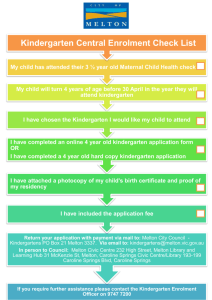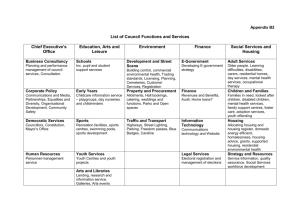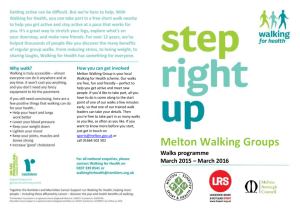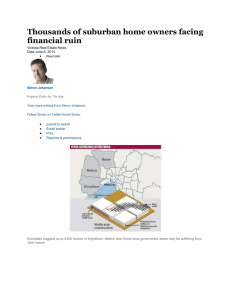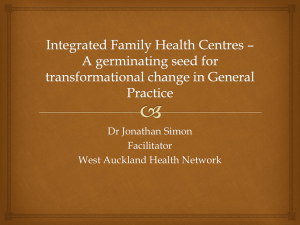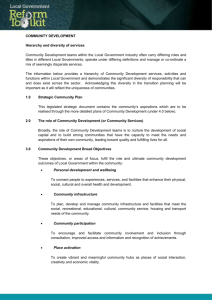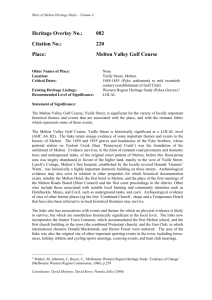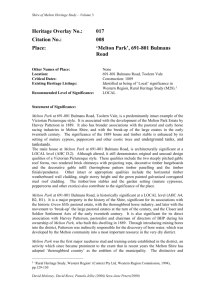Local model of integrated working by Melton Borough
advertisement
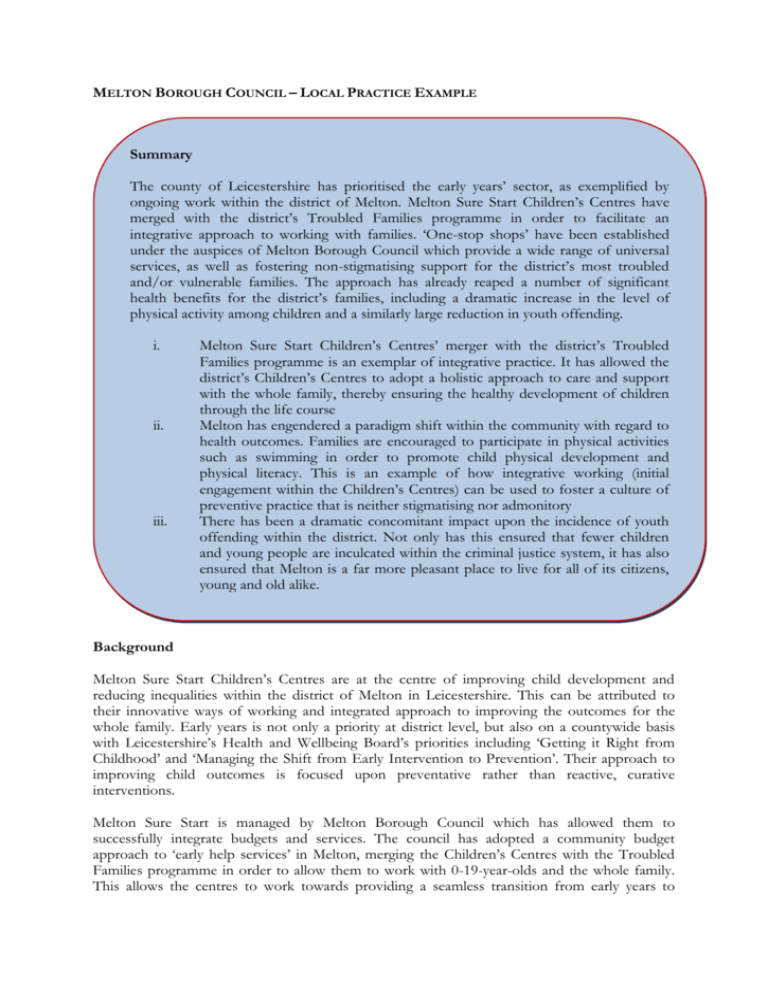
MELTON BOROUGH COUNCIL – LOCAL PRACTICE EXAMPLE Summary The county of Leicestershire has prioritised the early years’ sector, as exemplified by ongoing work within the district of Melton. Melton Sure Start Children’s Centres have merged with the district’s Troubled Families programme in order to facilitate an integrative approach to working with families. ‘One-stop shops’ have been established under the auspices of Melton Borough Council which provide a wide range of universal services, as well as fostering non-stigmatising support for the district’s most troubled and/or vulnerable families. The approach has already reaped a number of significant health benefits for the district’s families, including a dramatic increase in the level of physical activity among children and a similarly large reduction in youth offending. i. ii. iii. Melton Sure Start Children’s Centres’ merger with the district’s Troubled Families programme is an exemplar of integrative practice. It has allowed the district’s Children’s Centres to adopt a holistic approach to care and support with the whole family, thereby ensuring the healthy development of children through the life course Melton has engendered a paradigm shift within the community with regard to health outcomes. Families are encouraged to participate in physical activities such as swimming in order to promote child physical development and physical literacy. This is an example of how integrative working (initial engagement within the Children’s Centres) can be used to foster a culture of preventive practice that is neither stigmatising nor admonitory There has been a dramatic concomitant impact upon the incidence of youth offending within the district. Not only has this ensured that fewer children and young people are inculcated within the criminal justice system, it has also ensured that Melton is a far more pleasant place to live for all of its citizens, young and old alike. Background Melton Sure Start Children’s Centres are at the centre of improving child development and reducing inequalities within the district of Melton in Leicestershire. This can be attributed to their innovative ways of working and integrated approach to improving the outcomes for the whole family. Early years is not only a priority at district level, but also on a countywide basis with Leicestershire’s Health and Wellbeing Board’s priorities including ‘Getting it Right from Childhood’ and ‘Managing the Shift from Early Intervention to Prevention’. Their approach to improving child outcomes is focused upon preventative rather than reactive, curative interventions. Melton Sure Start is managed by Melton Borough Council which has allowed them to successfully integrate budgets and services. The council has adopted a community budget approach to ‘early help services’ in Melton, merging the Children’s Centres with the Troubled Families programme in order to allow them to work with 0-19-year-olds and the whole family. This allows the centres to work towards providing a seamless transition from early years to adolescence, and then into adulthood. Budgets from sport, physical activity, health, housing, community safety, and customer services are all integrated into the Children’s Centres. This has established a ‘one-stop shop’ for families where they are able to access a wide range of services including health advice, domestic abuse support, and adult learning directly related to parenting. Model With this is mind the council received funding from the European Social Fund in order to create its pilot project ‘Me and My Learning’. This has a merged single budget in order to tackle several outcome areas, including improved health, helping vulnerable people back into employment, better parenting, and creating better citizens. The overall aim of this project and the associated early help services is to create and cement behaviour change within the district’s troubled and/or vulnerable families. The council’s approach to health within the Children’s Centres is an innovative and creative way of working, using existing resources and budgets and moulding them to suit the distinct and nuanced needs of the district. Children’s Centre funding is used to part-fund a post alongside funding from Public Health, via a commissioning process centrally coordinated by the County Sports Partnership. This officer, titled Physical Activity Development Officer (PADO), works in both the Children’s Centre and Sport and Health teams within Melton Borough Council, ensuring full integration of the health and physical activity programme within the centres. This also enables access to other funding streams and budgets. The Sport and Physical Activity Commissioning Plan for Melton is worth almost £600,000. Some of this money is available for ‘sub-commissioning’, thereby enabling the officer to work with local voluntary and community groups to allow them to take control of, and influence, the health and activities in their area. Multiagency working Having this officer in post has created better links with other health services such as the health visiting team, school nurses, the midwifery service, the dietetics service, and the Stop Smoking service. Therefore when families are referred to the Children’s Centres they immediately have access to a wide range of services. The PADO is trained in smoking cessation and works closely with the county team to provide one-to-one support for Melton’s most targeted and vulnerable adults, as well as working with the smoking-in-pregnancy specialist to ensure that this target group gets the in-depth support which they need. This officer receives notifications from the midwifery team if there any concerns around pregnancy, BMI, or smoking during pregnancy. This allows them to be referred onto specialist support such as the smoking-in-pregnancy specialist. As health visitors are now required to contact all antenatal mothers, closer working between the PADO, family outreach workers, and health visitors is occurring. This has proved particularly effective with the district’s vulnerable families, giving a more robust and joined-up service and engaging families with the Children’s Centres at the earliest possible opportunity. Lifestyle pathway Within the Children’s Centres there is a lifestyle pathway for early years. This all starts pre-birth where prenatal exercise is available. Studies have found that babies born to mothers who exercise during pregnancy are born with more mature brains. These sessions are run by a qualified midwife, who is able to support and guide mothers through their pregnancy. Once the baby is born, there is a wide range of activities that can be accessed, including postnatal yoga, baby massage, and baby yoga. These help to promote bonding and attachment and aid development. There are other services within the Children’s Centres that can be accessed, including ‘Sing-aSong-a-Story’ and ‘Chatterbox’ which promote language and literacy, and the ‘Stay and Play’ service which promotes play from birth through to 5 years old. There is also a thriving breastfeeding peer support group for all new and expectant mothers. Child physical development and physical literacy Another priority in Melton is concerned with child physical development and physical literacy. The council is fully aware of the negative impacts upon child development that are associated with having no physical play or activity, including the adverse effects it has on the brain. Melton Borough Council subsequently provides a wide array of physical activities in order to help develop these areas. For instance, swimming lessons are available for the whole family. Targeted lessons and universal sessions are both available as studies have found that babies who go swimming with their parents from an early age have a significant improvement in language and intellectual capital above the normal population. Music and movement sessions from birth to 5 years old, outdoor activities such as scavenger hunts, active play sessions focussed upon improving balance, and travelling and object control and balanceability sessions based around improving balance and coordination on a balance bike, are all provided free of charge for families attending the Children’s Centres. Currently 85% of parents attending these sessions have reported an increase in the amount of time their child spends being physically active; 83% have reported that they are spending more time as a family undertaking family-based physical activity; and 100% of parents now feel more confident undertaking physical activities at home with their children. ‘Purposeful Play’ project As physical development and physical literacy are crucial for a baby to grow into a healthy, wellbalanced child, the council is working closely with its early years’ settings on a countywide ‘Purposeful Play’ project coordinated by Leicestershire and Rutland Sport and the County Sports Partnership. This is intended to educate them on the importance of being physically active, the concomitant implications of a lack of activity, and how they can incorporate more activity into their settings. This is the first time that the council has worked closely with a large group of early years’ settings. Feedback has been extremely positive to date, with several now implementing a physical activity policy and adapting more active time into their daily routine. Children’s Centre staff are directly involved in this project and are supporting the settings. The health visiting team will be attending future meetings, where they will discuss tracking and how early years’ settings, Children’s Centres, and the health visiting team can work together more closely. PANDAS (Pre- and Post-Natal Depression Advice and Support) group As the district’s Children’s Centres are a ‘one-stop shop’ for families, other services are on hand to improve not only child, but also family, outcomes. A PANDAS (Pre- and Post-Natal Depression Advice and Support) group was set up to help mothers experiencing pre- and postnatal depression. All staff work closely with this group to ensure its sustainability and that mothers receive the correct advice and support. Using the community safety budget the council is also able to provide a domestic abuse service on-site. As well as having the PADO who is dedicated to health and activity, health is also a large focus of other commissioned services such as Community Outreach, Stay and Play, and Learning in the Community. The PADO has a key role in encouraging and supporting these services to do this. All services work together closely to provide activities which promote physical play, healthy eating, language, and literacy. Learning in the Community provides parents with activities that are centred around toddler cooking, first aid, and qualifications in subjects including Maths and English. By educating the parents and up-skilling them in order to be prepared for work, the council is providing better outcomes for the entire family. Integrative practice All staff work closely with the families who access the centres. If a family requires extra support in accessing an activity then they are provided with it, e.g. language and literacy sessions in the home environment as opposed to within the centre. As the health visiting team and commissioned services are an integral part of the Children’s Centre team, information is shared and the referral pathway for services is fully understood. Having the majority of partners colocated under one roof in the Melton Borough Council offices has also created an environment that encourages and fosters partnership working. The council offices are the base for workers from the Troubled Families programme, probation services, Job Centre Plus, NHS Partnership Trust, Citizen’s Advice Bureau, and the Children’s Centre itself. This allows face-to-face contact with other officers and promotes information sharing. This has been crucial in providing a whole family approach and facilitating support to the troubled and vulnerable families living in Melton. Results Through this integrated whole family approach the council has recorded improvements in a number of related areas: i. ii. iii. iv. over 85% of parents reported increased levels of physical activity in their children a drastic drop in youth offending has occurred with a reduction of more than 90% in the number of young people going through the criminal justice system a reduction in reception age obesity a reduction in smoking prevalence and an increase in Early Years Foundation Stage (EYFS) scores. This was integral in achieving a ‘good’ rating from OFSTED under the new inspection framework in July 2013.

